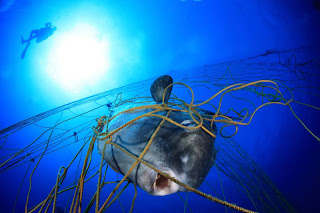
"the world's oceans are remarkably similar to public bathrooms. No one owns them, and the people who use them have no incentive to keep them clean.
So it is with fishing policies throughout much of the world. While government regulations have shortened fishing seasons and brought lawsuits on some unruly actors, commercial fishing largely remains a "take all you can get any way you can get it" business. As a result, as much as one third of the world's fisheries have collapsed, and many others teeter on the brink.
How can we reverse the sorry state of the seas? How about selling them off? At first glance, it might look like handing a chunk of ocean to a fisherman or an entire fishing company is ludicrous; they'd just hoover up all the fish in the area and move on. But according to a new study, the government of Chile has met with great success in turning over its maritime resources to private industries.
The public bathroom analogy is an idea more often referred to as "the tragedy of the commons." Since the 1960s scientists have understood that any unowned natural resource is likely to be ravaged by people seeking to use those resources, either out of greed or a simple need to survive. It's a clear pattern in humanity's use of almost everything the world has to offer -- water, forests, wildlife populations, even air. Nobody owns them, so everybody exploits them.
This isn't a workable arrangement on any scale. Local, regional, and global populations expand, and eventually a resource is overwhelmed. In parts of the world, some fisheries have already been decimated; for others it remains just a matter of time.
However, Chile has shown that by handing territorial rights to pieces of the ocean to both individual and large-scale fishing interests, they can turn fishermen into responsible stewards and protectors of their environment:
The new laws gave exclusive ocean territories to local 'artisanal' fishers, and excluded the big industrial fishing fleets, which had their own exclusive fishing zone.
Scientists and small fishers then worked together to understand and rebuild the shattered fish stocks in their zone, leading to a shared vision and voluntary agreements on how to manage them. Fishing pressure was reduced in the industrial fishing zone by cutting the number of big vessels.
The authors of the study note that Chile is in many ways a unique example -- the country has recently undergone political upheaval and its leaders have been very open to new ideas about how its resources should be managed. But the country's success should be taken as a hopeful sign that a similar model -- one of privatizing the oceans, in effect -- could be a revolutionary new force for ensuring the long-term sustainability of the planet's immensely important fisheries.
Image: Alessio Viora/Marine Photobank
Source: http://news.discovery.com/earth/should-we-sell-the-oceans-to-save-them.html
I wonder how this impacted fish prices in Chile?
ReplyDeleteGood question! Lets look into it!
ReplyDelete